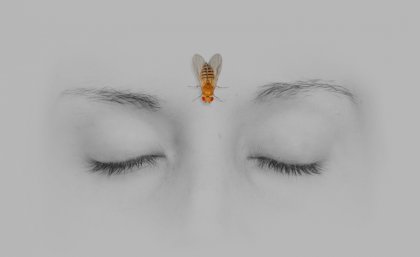
An international study on sleep and learning in flies has shown a good night’s sleep might be vital for retaining our capacity to learn and remember, with implications for the treatment of human disorders such as Alzheimer’s disease.
University of Queensland PhD student Leonie Kirszenblat said the research, published today in Current Biology, found that increased sleep temporarily cured flies with learning defects, leading to a 20 per cent improvement on a memory task.
Different genetic or pharmacological methods were used to induce the flies’ sleep, to prove that it was indeed sleep that cured the flies, rather than any specific drug or genetic pathway.
The research, led by Washington University, involved UQ’s Queensland Brain Institute and the universities of Oxford and Surrey.
Ms Kirszenblat said the study reinforced the therapeutic benefits of sleep, even if the different functions of sleep remained mysterious.
“A lot of human disorders result in sleep problems. For instance, many Alzheimer’s disease patients report problems sleeping,” she said.
“But in humans, it is difficult to determine causality: does bad sleep lead to cognitive disorders, or do these disorders cause bad sleep?”
The study used strains of flies with severe learning defects, or flies with memory problems that develop as they age.
“We forced them all to sleep for two days, and afterwards they all became normal learners,” Ms Kirszenblat said.
“For example, we tested flies with a mutation in a gene called presenilin, which has been linked to early-onset Alzheimer’s disease, and we put the flies to sleep by activating GABA-A receptors in their brain – which humans also have.
“So it’s possible that simply by finding effective methods of promoting natural sleep, perhaps we will see some improvement in patients’ conditions.”
Humans and flies share most genes that are important for memory, leading the researchers to conclude that the work could lead to discoveries about improving memory in humans.
“The next step is to understand the actual mechanism that improves memory after sleep,” Ms Kirszenblat said.
“If we could understand how sleep improves memory in the fly brain, perhaps these mechanisms could be tweaked to improve memory in humans as well.”
QBI’s Associate Professor Bruno van Swinderen said the Drosophila fly strains were easy to work with and study.
“This work offers a real opportunity finally to understand why we sleep, what it is good for, and how it works to maintain a healthy brain,” he said.
“At QBI we have designed new experiments in order to better study sleep in the fly model, and these were crucial for the results of this international study.
“One way we test and measure the flies’ memory is to use a visual learning task in which they must learn to avoid light that they are normally drawn to, by associating it with punishment.
“We test and measure their sleep by probing their responsiveness to different vibration intensities throughout successive days and nights, using a sophisticated computer interface we call DART: Drosophila ARousal Tracking.”
Media: Darius Koreis, +61 7 3346 6353, d.koreis@uq.edu.au; Associate Professor Bruno van Swinderen, +61 7 3346 6332, +61 420 365 450 or b.vanswinderen@uq.edu.au.











